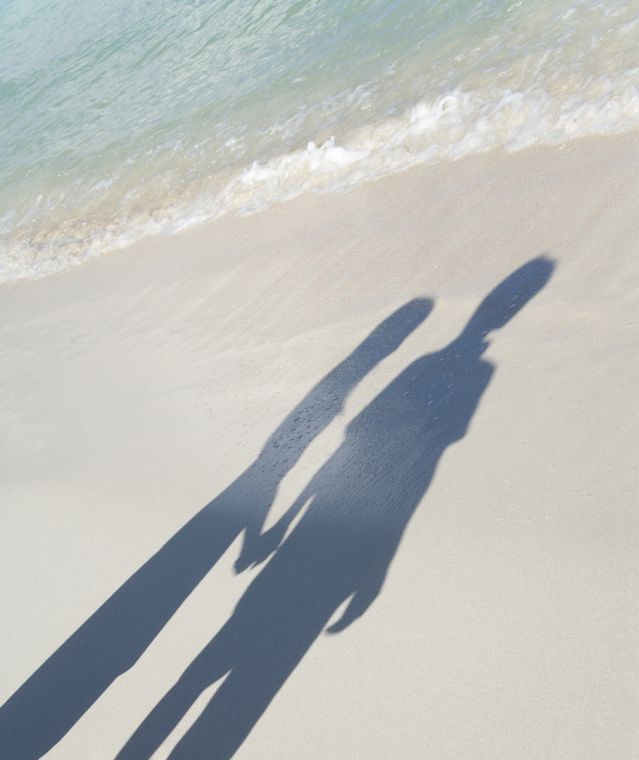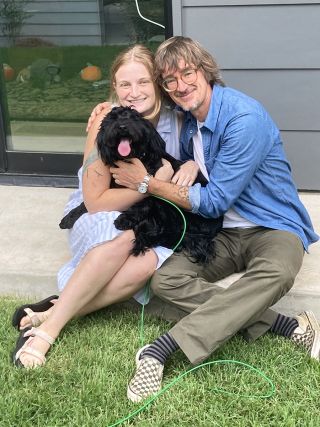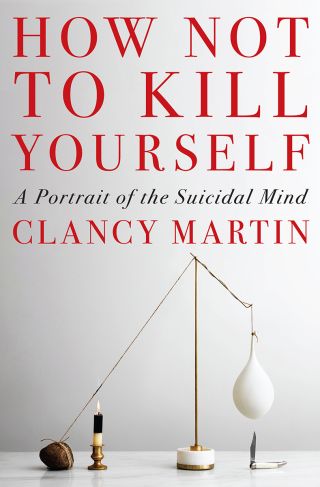Swimming Back to Shore
A father plagued by suicidal ideation makes a rescue.
By Clancy Martin published March 7, 2023 - last reviewed on June 15, 2023

Six months into my first year of recovery from alcoholism, in the summer of 2009, I tried to drown myself. It was not my first attempt to take my own life. Thoughts of killing myself are among my earliest memories, and I tried twice before I was 18. My twenties and thirties were characterized by a slow descent into a serious drinking disorder and multiple suicide attempts.
On the outside, though, things were mostly fine. I had enjoyed owning several luxury jewelry stores with my brothers, and when I found that life in business wasn’t what I wanted, I earned my Ph.D. in philosophy and took a job at the University of Missouri in Kansas City. I had three children I adored and was happily married. My first book had been published a couple of months earlier, and I was midway through my second. I was newly tenured and chair of the philosophy department.
But on the inside, I was often so depressed I could barely get out of bed and pretend to be an ordinary person. After an attempt to hang myself—my wife found me, and it was off to the hospital and the psych ward—I finally quit drinking. I had been using booze for years to treat my suicidal ideation, my anxiety, and my depression. At this point, the Lamictal, the Ativan, the lithium, the baclofen, and the Paxil my psychiatrist had prescribed just weren’t doing the job.
My wife and I knew we needed a vacation. Sunshine is always good for my mental health—suicide rates are in fact consistently lowest in equatorial regions—so we took the whole family to Mexico. We were spending a month in Puerto Vallarta. We had rented a house on a cliff above the ocean, in Viejo Vallarta, and at dinnertime I would often walk a half-mile or so to a good restaurant just off the beach to pick up a meal for us.
One night, fetching dinner for everyone, I was especially down. I had that feeling I get when I know my depression is about to drop into a chasm. I hear a sound like metal wings scraping in the back of my head, and I suddenly understand with absolute certainty, a conviction that nauseates me and makes my mouth fill with saliva, that I am irredeemably loathsome. As I watched the sun setting I thought, I can’t continue to do this.
The solution was right there in front of me. I’d swim into the nighttime Pacific as far as I could and just keep swimming until I drowned. It was a purely selfish thought. I was truly not much use to my family at this time. They tried to include me in things but eyed me nervously, knowing that their formerly happy dad had been replaced by this sad-faced, medicated, often disoriented person who didn’t take much pleasure in anything. I did understand that I was providing at least some help to my wife in an everyday way with the kids and that I was, at this time, her only source of income. But I also knew that they would be all right financially, and that in the long term all of them would be much better off without me.
Plus the depression I was suffering was excruciatingly painful—I mean, it was agony—and I knew it was about to get much worse. I also had a dreadful conviction—an intensely familiar feeling I have fought most of my life—that an unknown personal disaster was imminent, one that would be humiliating or inexcusable, or at any rate unexcused, from which I would not recover and for which no one would forgive me. It would be something worse than suicide and that only suicide could prevent. But once it happened, not even the act of killing myself could erase it.
That evening after bringing dinner back up to my family, I lied and said I needed a snack. My wife Rebecca, knowing something was up, asked if I couldn’t wait until morning. I don’t know if she was worried that I wasn’t going to be back in time to help put the girls to bed, or if she thought I was going out to sneak a drink (I believe she knew how committed I was to my sobriety, but she’d been burned before), or if she suspected the truth. Probably she could see I was lying about something but didn’t know what it was or why.

It was a dark night. There were no arguments for or against suicide in my mind. I just knew what I wanted to do, which was extinguish myself, and this time I was going to do it. I took the stone steps down to the beach and undressed except for my boxers. I folded my clothes and left them next to my shoes, high on the beach where they wouldn’t be swept away. If she found my clothes, Rebecca would know the truth, but she would tell herself and the girls that I always loved to swim in the ocean at night, which was true, and that I just wasn’t a strong swimmer, which was also true. I put my glasses on top of the pile. I am extremely nearsighted—which sounds like a joke, in this context, but I have been since elementary school—and naturally I couldn’t use them in the water. It will make it a bit easier, I thought, not being able to see how far out I’ve swum, and not being able to find my way back, if I try to.
I swam out into the calm night sea. I thought of sharks, as I always do when swimming in the ocean at night. Even on the several occasions when I’ve brushed against something beneath the black water far from land, and the electricity of real animal fear ran through my body, I’ve tended to think, Well, at least there will be a resolution. I swam, miserably, not enjoying it. The water was cool but not cold. I swam until the beach was far behind me, and I didn’t really know which direction I was going, only that I was heading away from the lights of Puerto Vallarta, which I could still see like distant fuzzy yellow orbs when I looked back. I swam until I was exhausted.
I knew I needed to swim as far as I could, that this was the only way I would succeed. I swam past the point of not being able to swim anymore. Then when I thought I couldn’t take another stroke, when I was gasping a bit and my arms and my legs were aching and I was all out of energy, I tried to sink. I pushed myself under with my arms.
Beneath the water I panicked and came back up. Then I used that jackknife dive they teach you in snorkeling lessons; you bend at the waist until you’re at a ninety-degree angle in the water, then lift your legs directly above you and the weight of them drives you down. I swam as deep as I could, down into the ocean, until it was noticeably colder. I started to run out of air. And like every other time I’ve tried to asphyxiate myself, I panicked, and scrambled like a terrified animal back to the surface, certain that I wouldn’t make it and desperate to breathe. I felt no moment of life affirmation or relief or thought of what a terrible, unforgivable thing I was doing to my children and my wife. I stayed selfish, despairing and ashamed through the whole process. Defeated, hopeless, I swam back to the beach. By the time I got home, my family was asleep. I apologized to Rebecca in the morning, telling her, “I just needed a swim.” She was angry but believed me.
The next day I wanted to spend a little one-on-one time with Zelly, who was then 14. Because she is my first-born, she has been through the toughest periods of my struggles with my various psychiatric problems, so I often feel a particular gratitude and debt to her. I suggested a hike—I’ve always found that long walks are among my best mental medicines—and she said, “Let’s wear our swimsuits under our clothes, and we can find a nice place to swim.” When we were passing the cove where, the night before, I had stacked my clothing and my glasses, she said: “It’s getting hot. We haven’t tried this beach yet.” The waves were up a bit, and it wasn’t the best beach for swimming during the day, in front of the break, because of the undertow. But we stripped to our swimsuits and swam close to the beach. For about half an hour we were having fun, just the two of us, playing in the ocean. Then a current took hold of her and started dragging her out.
“Dad!” she shouted. She was crying, panicking, scrambling in the water.
I managed to grab hold of her, and she clung to me, pulling herself up around my shoulders. We swam back to shore. It took us 10 terrifying minutes to reach the sand. Zelly was crying, but OK.
She never would have gone swimming in that rough water in the first place if she hadn’t been with me, but I had just kept my child from drowning. I wasn’t proud of myself—I was immensely relieved. And some part of me told myself, You see that? Do you understand? Am I getting through to you? It’s not just about you. You have to be there. You never know when they might need you. Not any one of the many other people in their lives who love them and care for them. But you. You in particular.
One of the paradoxes of suicidal thinking is that their very willingness to kill themselves, in the mind of those who want to take their own life, is further proof that they deserve to die and that the people they love would be better off without them. They think: I am so selfish, so loathsome a person that I am willing to leave them with the damage my suicide will inflict. That alone shows me how much they need to be rid of me.
But lying there in the sand, next to Zelly, both of us catching our breath, holding hands and kind of laughing and crying at the same time, that self-loathing lifted a bit. Yes, of course, she deserved a better father than she had. Nevertheless, she needed me.
That was not my last attempt. I would try to kill myself again. Like many other people, I expect to live with suicidal ideation until I die. But these days, more and more, I have that feeling I discovered after carrying Zelly out of the water. I am able to think of things I have done or might yet need to do for my children or my wife or the other people I love and care for: simple things, like helping my daughter Portia with her algebra or my daughter Margaret with an essay about a film, or more complicated things, like supporting a fellow alcoholic or talking another suicidal person off the ledge. Thinking to myself: I am a dad, and I can be there for my children when they need me; or, I am a husband and I love my wife; or even, I have survived suicide, so maybe I can help others survive it. These recognitions bolster my growing belief that I should stick around rather than check out. And sometimes, when the thought of suicide is really staring into my eyes like a cobra, I simply try to remind myself of that swim the day after I tried and failed to drown, when I saved my daughter’s life.
Clancy Martin is the author of How Not to Kill Yourself: A Portrait of the Suicidal Mind.

